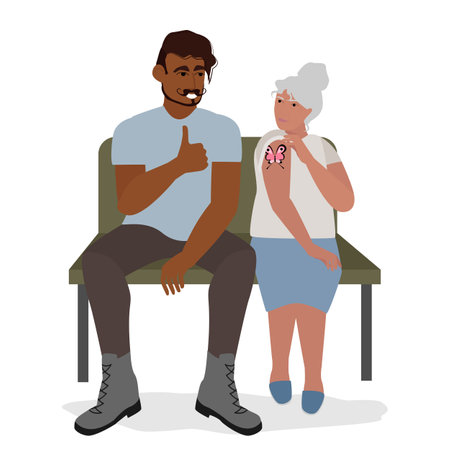Introduction to Homeopathy in the UK
Homeopathy has held a unique and enduring presence within British healthcare for over two centuries. Originating in late 18th-century Europe, homeopathy was welcomed by Victorian society as a gentle, natural alternative to conventional medicine. Over time, it became woven into the fabric of British wellness, with dedicated homeopathic hospitals and practitioners serving communities across the country. Today, while mainstream medical approaches dominate, many families in the UK still turn to homeopathy—especially when caring for children and the elderly—attracted by its holistic philosophy and focus on minimal intervention.
This natural system of healing is rooted in the principle of “like cures like,” using highly diluted substances to stimulate the body’s own healing responses. The British public often perceives homeopathy as a safe, non-invasive choice that supports overall well-being, particularly valued in sensitive stages of life such as childhood and old age. Its popularity endures among those seeking more personalised care, with many appreciating its alignment with a wholesome, balanced lifestyle. Within the UK’s diverse tapestry of health practices, homeopathy continues to spark thoughtful discussion—balancing tradition, scientific debate, and a deep-rooted cultural appreciation for gentle, natural remedies.
2. Understanding Homeopathy for Children
When it comes to homeopathy for children in the UK, parents often seek gentle and natural approaches to support their child’s wellbeing. Homeopathic remedies are popular among families looking for holistic options to address minor ailments, such as teething discomfort, colic, and mild coughs or colds. However, it is essential to approach these remedies with both care and an understanding of best practices.
Commonly Used Remedies for Children in the UK
| Remedy | Common Uses | Typical Considerations |
|---|---|---|
| Chamomilla | Teething pain, irritability, restlessness | Often chosen when a child is inconsolable and upset |
| Pulsatilla | Mild colds, clinginess, weepiness | Used when symptoms improve with fresh air and attention |
| Aconite | Sudden onset of fever or fright | Best used at the first sign of illness or shock |
| Belladonna | High fevers with redness and heat | Used when a child appears flushed and restless |
| Arnica | Bumps, bruises, minor injuries | A go-to remedy for physical trauma in active children |
Safety Considerations for Young Patients
The safety of children is always paramount. While homeopathic remedies are generally considered safe due to their high dilution levels, it is crucial to:
- Avoid self-prescribing for serious conditions: Homeopathy should not replace conventional medical treatment for significant health concerns such as persistent high fever, breathing difficulties, or suspected infections.
- Select appropriate potency: Most over-the-counter homeopathic remedies in the UK are low-potency and safe for short-term use, but professional guidance helps ensure suitability.
- Be mindful of allergies: Although rare, some remedies may contain lactose or other fillers that could cause reactions in sensitive children.
- Monitor for side effects: If any unexpected symptoms occur after using a remedy, stop immediately and consult a healthcare professional.
The Importance of Professional Advice
Homeopathy can be a supportive part of a family’s natural health toolkit, but seeking advice from a registered homeopath or GP familiar with integrative care is highly recommended. In the UK, qualified practitioners adhere to strict standards and can tailor remedies specifically to your child’s needs, taking into account both physical symptoms and emotional wellbeing. This ensures that any course of treatment is safe, appropriate, and complementary to other forms of care your child may be receiving.

3. Homeopathic Care for the Elderly
Homeopathy has gained a gentle but steady presence in British communities, particularly among older adults seeking natural ways to support their health and overall wellbeing. In the UK, many elderly individuals turn to homeopathy as a complementary approach, appreciating its mild nature and personalised focus. As we age, our bodies may become more sensitive to both conventional medicines and environmental factors, making gentle alternatives like homeopathy appealing.
Common concerns among the elderly—such as joint stiffness, digestive discomfort, sleep disturbances, and emotional shifts—can be addressed with carefully selected homeopathic remedies. Popular choices in Britain include Arnica montana for aches and bruises, Rhus tox for joint stiffness that improves with movement, and Nux vomica for digestive upsets often linked with changes in routine or medication. These remedies are used in low potencies, always tailored to the individual’s unique constitution and lifestyle.
Personalisation is at the heart of British homeopathic practice. Practitioners take time to understand not only physical symptoms but also emotional wellbeing and daily habits. This holistic approach ensures that care plans resonate with each person’s story and preferences. For example, an elderly person experiencing loneliness or bereavement might benefit from remedies such as Ignatia, chosen after thoughtful consultation.
Many local communities across the UK offer access to qualified homeopaths who are registered with reputable organisations like the Society of Homeopaths or the Faculty of Homeopathy. These practitioners work collaboratively with GPs and other healthcare providers, ensuring that any homeopathic care complements existing medical treatments safely. Family involvement is also encouraged, fostering supportive environments where elderly loved ones feel heard and valued.
In summary, homeopathy can play a nurturing role in promoting comfort and resilience during later life stages. With attention to individual needs and a respect for traditional British values of kindness and community care, homeopathy remains a cherished option for many elderly people seeking to maintain their vitality naturally.
4. Regulations and Professional Guidance
In the United Kingdom, homeopathy is regulated differently compared to conventional medicine, and it is essential for both parents and carers of elderly individuals to understand these distinctions before seeking treatment. Homeopathic remedies are considered complementary or alternative therapies, and while they can be purchased over-the-counter, professional advice is highly recommended—especially for vulnerable groups such as children and the elderly.
Understanding UK Regulations on Homeopathy
Homeopathic medicines in the UK are regulated by the Medicines and Healthcare products Regulatory Agency (MHRA). While these remedies do not require the same rigorous clinical testing as pharmaceutical drugs, manufacturers must still comply with quality standards. Below is a summary table highlighting key regulatory aspects:
| Aspect | Details |
|---|---|
| Governing Body | MHRA (Medicines and Healthcare products Regulatory Agency) |
| Prescription Status | Most homeopathic remedies are available over-the-counter; some may require a registered practitioner’s prescription |
| Quality Control | Manufacturers must adhere to specific safety and labelling regulations |
| NHS Coverage | Limited; most NHS services have phased out funding for homeopathy, so treatments are usually private |
Finding Qualified Practitioners in the UK
To ensure safe and effective care, always seek a qualified homeopath who has undergone appropriate training and adheres to a recognised code of ethics. In the UK, reputable practitioners are often registered with one of the following bodies:
- The Society of Homeopaths (SoH)
- The Faculty of Homeopathy (for medically qualified professionals)
- The Alliance of Registered Homeopaths (ARH)
You can verify a practitioners credentials by checking their registration status on these organisations websites. Its advisable to select a practitioner who has experience treating children or older adults, as their needs can differ significantly from those of the general population.
What to Expect During a Consultation
A typical homeopathic consultation in the UK is thorough and holistic. The initial session may last up to an hour or more, during which the practitioner will ask about:
- Your child’s or elderly relative’s full medical history
- Lifestyle factors such as diet, sleep patterns, and emotional wellbeing
- Any current medications or ongoing treatments
- Specific symptoms you wish to address with homeopathy
The practitioner will then recommend an individualised remedy and provide guidance on dosage and follow-up appointments. For children and seniors, gentle communication and careful monitoring are especially important to ensure safety and comfort throughout the process.
5. Precautions and When to Seek Medical Advice
While homeopathy is a popular complementary therapy in the UK, especially among families with young children and elderly relatives, it is vital to recognise its boundaries and use it responsibly. Homeopathic remedies can offer gentle support for minor ailments, but they should never replace professional medical care for serious or acute conditions.
Knowing the Limits of Homeopathic Care
Homeopathy may be helpful for managing everyday discomforts such as mild colds, teething, or general anxiety. However, if symptoms persist or worsen, it’s important not to rely solely on homeopathic treatments. The NHS does not recommend homeopathy as a replacement for conventional medical treatment, particularly when dealing with chronic illnesses or emergencies.
When to Consult Your GP or NHS Services
If a child develops a high fever, persistent cough, rash, difficulty breathing, or shows signs of dehydration, seek immediate medical attention through your local GP or NHS 111 service. Similarly, elderly individuals experiencing sudden changes in mobility, confusion, chest pain, or severe pain should receive prompt evaluation by a healthcare professional. These signs may indicate underlying conditions that require evidence-based intervention.
Maintaining Holistic Health
Integrating homeopathy into a balanced lifestyle can be beneficial when used alongside conventional healthcare. Ensure regular check-ups with your GP and stay up-to-date with vaccinations and screenings recommended by the NHS. Maintaining a wholesome diet, staying hydrated, and encouraging gentle exercise are also essential steps in supporting both children’s growth and seniors’ vitality.
Ultimately, open communication with healthcare providers helps ensure the safety and wellbeing of all family members. By respecting the boundaries of homeopathy and knowing when to seek professional advice, you can make confident choices that support natural health while prioritising safety.
6. Integrating Homeopathy into Everyday Life
Bringing homeopathy gently into the daily lives of children and the elderly in the UK can be a natural way to support wellbeing alongside conventional health care. Here are some practical, safe suggestions for weaving homeopathic principles into your family’s routines, always with a mindful approach and respect for individual needs.
Start with Simple Remedies
For families new to homeopathy, beginning with well-established remedies such as Arnica for minor bumps and bruises or Chamomilla for teething discomfort in children is a gentle introduction. These remedies are widely available at UK health shops and pharmacies, but always consult a qualified practitioner for guidance on appropriate dosing and use.
Support with Nourishing Diets
Diet plays a vital role in overall wellness. While homeopathy does not replace nutritious meals, it complements a diet rich in seasonal British produce—think root vegetables, leafy greens, oats, and berries. Encourage children and older adults to enjoy wholesome, locally sourced foods, as these lay the foundation for vitality that supports any homeopathic routine.
Daily Routines and Gentle Movement
A calm daily rhythm helps everyone thrive. Simple practices such as regular mealtimes, peaceful bedtime routines, and gentle physical activities like walking in the park or gardening can enhance the effects of homeopathy. For the elderly, low-impact exercises recommended by local community centres or NHS guidance help maintain mobility and mood.
Self-Care Practices
Encourage moments of self-care throughout the day: herbal teas (like chamomile or nettle), warm baths with Epsom salts, or mindfulness breathing exercises are all nurturing habits that pair well with homeopathic approaches. For both children and elders, these rituals create space for relaxation and healing.
Cautions and Community Resources
Always remember that while homeopathy is gentle, it should not replace medical care when needed. In the UK, many GPs are open to complementary therapies—don’t hesitate to discuss your interests with your healthcare provider. Local support groups, homeopathic practitioners registered with recognised bodies such as the Society of Homeopaths, and NHS online resources are excellent places to find trustworthy information tailored to British families.
By thoughtfully integrating homeopathy with everyday diet, lifestyle choices, and self-care practices rooted in UK traditions, you nurture balance and resilience at every age—always with kindness and care at heart.


